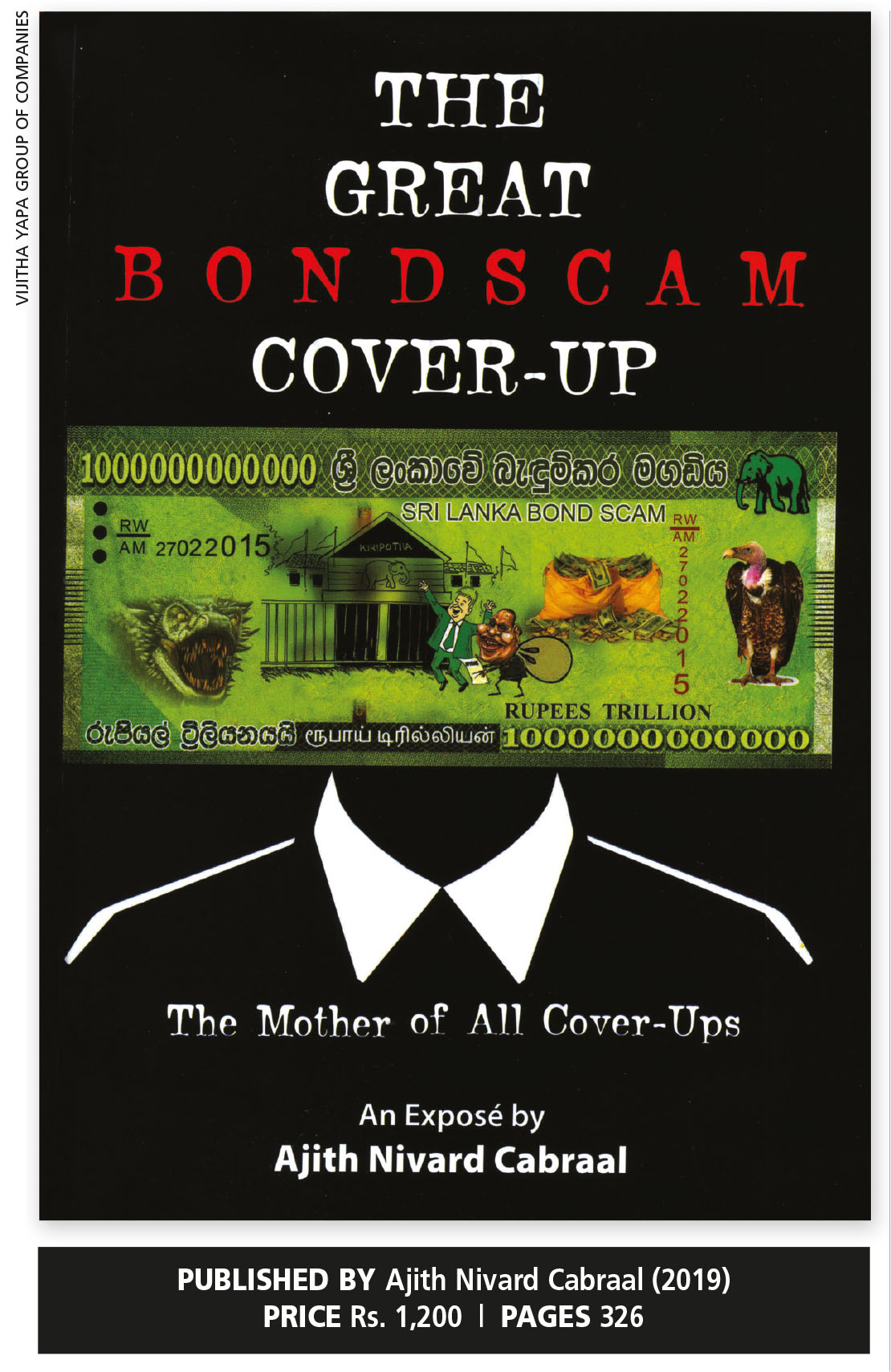BOOKRACK
By Vijitha Yapa
Bonds are in the news. And by the time the 25th James Bond movie ‘No Time to Die’ is released in April, there could well be a huge battle going on in Sri Lanka over the bond scandal of 2015. Former Governor of the Central Bank of Sri Lanka (CBSL) Arjuna Mahendran’s putative extradition from Singapore would hog the spotlight.
New facts uncovered by a forensic audit undertaken by BDO India have revealed that Sri Lanka may have lost between an estimated Rs. 9.9 billion and 10.4 billion rupees in over 1,100 direct placements of bonds that bypassed auctions between 2005 and 2015.
This audit was commissioned following the recommendation of a presidential commission of inquiry into the bond scam of 2015/16 through rigged auctions. A separate report estimated that an estimated 6.6-9.6 billion rupees may have been lost in 2015/16 though rigged auctions. Losses are estimated as deviations from a base rate calculated from secondary market yields.
The controversial book released by Ajith Nivard Cabraal titled ‘The Great Bondscam Cover-up – The Mother of All Cover-ups’ has also been in the news. The book discusses events up to November 2019 and was released prior to parliament receiving the forensic report.
At the start of the book are the unusual words: “This book is not dedicated to all those who knowingly or unknowingly worked to conceal/suppress the bond scam.” The author then proceeds to name Central Bank senior management, staffers and others. It’s the first time I have seen such a negative dedication in any publication.
Cabraal blasts the Special Presidential Commission of Inquiry to Investigate, Inquire and Report on the Issuance of Treasury Bonds, for its reluctance to identify and name the powerful mastermind who perpetrated the scam. The author says he wrote the book so that someday, “those white-collar tie coat attired common criminals” could be brought to justice.
This reminds me of Sir John Kotelawala’s observation on government commissions. He said they were like going to the toilet. First, there is a lot of noise and then some paperwork; and finally, the whole thing is dropped and there’s nothing to see afterwards!
Sir John had an exemplary wit. He once quipped that World Bank experts come to Ceylon to find out and leave before they are found out.
Cabraal points out that on 11 January 2015, a mere three days after the presidential election, a certain ‘Business Basil’ had issued a prophecy on a popular business website called Equity Forum claiming that Perpetual Treasuries would probably secure a large volume of business from Treasury bills and bonds in the new so-called ‘yahapalanaya government.’
This was because the new Governor of the Central Bank was tipped to be Arjuna Mahendran whose son-in-law Arjun Aloysius was Free Lanka Capital’s driving force. And it was only 47 days before the bond issue where the amount was upped mysteriously without warning from Rs. 1 to 10 billion rupees, we’re told.
In a special report, Auditor General Gamini Wijesinghe said that the two bond issues have amounted to a massive loss of Sri Lankan Rupees 1,674.2 million to the state.
Cabraal alleges that the Bank of Ceylon had actively connived in this activity, “which is rumoured to have been ‘instructed’ by a powerful unseen hand to accommodate” the special facility of 10 billion rupees to Perpetual Treasuries.
Former CBSL Deputy Governor Dr. W. A. Wijewardena says that the former Prime Minister Ranil Wickremesinghe demonised the system by stopping the direct placement system and operating only the auction mechanism. He claims that this paved the way for primary dealers with inside information to corner the market at the expense of others.
The fundamental rights case filed in the Supreme Court by three prominent personalities is described as an exercise by three “well-known sympathisers of the UNP.” The petitioners are economist and former UN official Dr. G. Usvatte-Aratchi, former member of the Public Service Commission Dr. A. C. Visvalingam and former Chairman of the Ceylon Chamber of Commerce Chandra Jayaratne.
Ex-premier Wickremesinghe had vehemently objected to the release of a COPE report in 2015, and parliament was dissolved with the support of President Maithripala Sirisena so that the COPE report was strangled. Another COPE report from its chairman Sunil Handunnetti was also sabotaged.
Cabraal has used his book to proffer his point of view on the bond scam. In the 1960s, soon after Chairman Mao Zedong wrote his book titled ‘Quotations from Chairman Mao Tse-Tung,’ I addressed a meeting in London where I predicted that his next book may well be titled ‘On Second Thought.’
I wonder whether Cabraal will publish a sequel soon…





